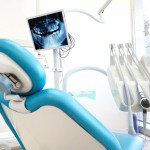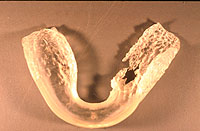Dr. Eric Buck and Dr. Hannah Burton, Dublin, OH family dentists, work hard to maintain your children’s oral health–just as you do! They advise parents to make routine exam and cleaning appointments a priority during the summer when school is not in session. It’s one less thing to do in the hectic fall season–and preventive dental care is so important. (more…)
Time for kids’ exams with your Dublin, OH family dentist
July 15, 2016
Does your dentist in Ohio have these key certifications?
February 25, 2016
 All dentists complete the same basic education — undergrad, then dental school and residency. These are all part of a good dental foundation, but excellent dentists know it’s just the beginning. Is your dentist in Ohio committed to improving throughout his or her career with continuing education? Is he or she a member of the top dental associations? Finding out can tell you a lot about the quality of care you’ll receive at their dental practice. Keep reading to learn more.
All dentists complete the same basic education — undergrad, then dental school and residency. These are all part of a good dental foundation, but excellent dentists know it’s just the beginning. Is your dentist in Ohio committed to improving throughout his or her career with continuing education? Is he or she a member of the top dental associations? Finding out can tell you a lot about the quality of care you’ll receive at their dental practice. Keep reading to learn more.
Finding the right Dentist in Dublin, Ohio
December 9, 2015
 When it comes to choosing a dentist, the first question any patient should ask is, “What dental service, amenity, or doctor qualification matters most to me?” The answer to this question, should guide any search for a dental practitioner.
When it comes to choosing a dentist, the first question any patient should ask is, “What dental service, amenity, or doctor qualification matters most to me?” The answer to this question, should guide any search for a dental practitioner.
(more…)
Tips from your Children’s Dentist: The Lesser Evils of Halloween Candy
October 26, 2015
 During the holidays, especially Halloween, eating healthy is a challenge for everyone, but one aspect of health that is often forgotten amidst the holiday bustle is oral health. High sugar and carbohydrate foods combine with bacteria in the mouth to form acidic, tooth decaying, gum irritating plaque. There are very few holiday favorites that don’t fall into the category sugar or complex carbohydrates. As your kids gather bags of Halloween candy, take a look at the contents of their trick-or-treating loot, and help them make good choices for their oral health this Halloween.
During the holidays, especially Halloween, eating healthy is a challenge for everyone, but one aspect of health that is often forgotten amidst the holiday bustle is oral health. High sugar and carbohydrate foods combine with bacteria in the mouth to form acidic, tooth decaying, gum irritating plaque. There are very few holiday favorites that don’t fall into the category sugar or complex carbohydrates. As your kids gather bags of Halloween candy, take a look at the contents of their trick-or-treating loot, and help them make good choices for their oral health this Halloween.
(more…)
THE IMPORTANCE OF DENTAL CARE FOR DIABETICS
October 26, 2014
While daily brushing and flossing and regular visits to the dentist are important for everyone, people with diabetes face a particular challenge since poorly controlled blood sugars raise the risk of a number of oral health problems. Uncontrolled diabetes impairs white blood cells, the body’s main defense against bacterial infections that can occur in the mouth. As diabetics’ ability to fight bacterial infections is reduced, they face a higher risk of developing gum inflammation (gingivitis and periodontitis). Other potential oral problems related to diabetes include dry mouth (which can lead to soreness, ulcers, infections, and tooth decay) and fungal infections (thrush) that arise from antibiotic use. Diabetics who smoke face an even higher risk of developing thrush and periodontal disease.
As discussed in today’s column, to the traditional issues considered specific to diabetics you can now add oral health. Regular brushing and flossing can be very beneficial to reducing plaque and bacteria from the mouth of a diabetic. We will know better how to help you achieve proper oral health if we know more about your diabetic health. We recommended seeking the professional dental advice DISTINCTIVE SMILES OF DUBLIN has to offer. Please call us at 614.792.1800 to schedule an appointment. We’re located at 5142 Blazer Parkway, Dublin. Creating Healthy Beautiful Smiles.
P.S. Because diabetes causes blood vessels to thicken, diabetics who do not properly control their blood sugar levels may not heal quickly after oral surgery or other dental procedures. ARCHIVES
Protect those chompers!
July 2, 2010
So as summer moves forward, kids are at playgrounds, riding bikes, and playing sports. From a dentist’s perspective, this is the time of year that we see the most fractured front teeth. Outside of caging our kids indoors, mouthguards are by far the best way to prevent those injuries. We all know that kids should wear mouthguards during football and hockey, but athletes need to also wear them in other sports as well such as baseball, basketball, soccer, etc. Mouthguards not only protect the teeth, but when an athlete is hit in the lower jaw, they absorb the forces. This protects the joint, ligaments, and muscles and can lessen the effects of a concussion.
The National Youth Sports Foundation for the Prevention of Athletic Injuries, Inc. found that 0.7% of injuries were in the orofacial area in football as opposed to basketball in which 34% of injuries were in the orofacial area. This is because football athletes are required to wear mouthguards. It was also estimated that the repair, reconstruction, and/or replacement of one broken front tooth of a teenager will cost between $10,000-$15,000 during a lifetime.
So there are basically two different types of biteguards. Over-the-counter boil and bite mouthguards and custom made mouthguards. Boil and bites are inexpensive and easy to use, but usually don’t fit very well and don’t last long either (see below).
This is a boil and bite mouthguard after only a few weekes of wear.
Custom mouthguards are specific to the athlete’s teeth and bite which allow them to last longer and do the job they were intended to… protect the teeth and absorb the forces. It’s a simple procedure of taking upper and lower impressions then a lab fabricates the mouthguard with any colors or logos that you want. They are more expensive, but if an athlete injures a tooth or the joint, the costs can me very high along with the possible long term treatments and discomfort that comes with such injuries.
So if you or someone in your family is interested in learning more about mouthguards or would like us to fabricate one, please give us a call. Regardless of what type of mouthguard, please wear them. I’d rather have a discussion about mouthguards versus how we’re going to repair a broken tooth.
Fluoride and the Adult Patient
June 15, 2010
by Christine 14. April 2010 01:59
At our office, we emphasize the optimal health of our patients and stay apprised of the latest research and development available in the world of dentistry. We’ve always known that fluoride is beneficial for children and their developing adult teeth. Adults can benefit from fluoride as well. You’ll notice that our practice is putting an emphasis on adult fluoride because of the many preventative benefits.
Fluoride is a naturally occuring mineral found in many foods and water. Our pediatric patients absorb fluoride systemically, either in food, water and /or fluoride supplements. After the age of 12 we no longer absorb fluoride systemically. The only way to get the benefits of fluoride is with a topical application directly to the teeth. Fluoride rinses and toothpaste with fluoride contain lower levels of fluoride and are used daily to help prevent cavities. Stronger forms of fluoride such as varnishes , gels, or foams can be applied by Lynn or myself in our office. Fluoride has many benefits, including protecting the teeth from decay, decreasing tooth sensitivity, strengthening root surfaces that have been exposed due to recession, reducing the effects of plaque and bacteria, and hindering/reversing the growth of developing cavities. Patients suffering from conditions such as dry mouth, radiation treatments to the head and neck, or periodontal disease can also benefit from fluoride treatments.
We are recommending a fluoride varnish once a year as part of a preventative maintenance program for a healthy mouth. This application takes only minutes, has no flavor, and can be completed at your next recare appointment. Lynn or myself can discuss whether fluoride would be a good addition to your dental treatment.


